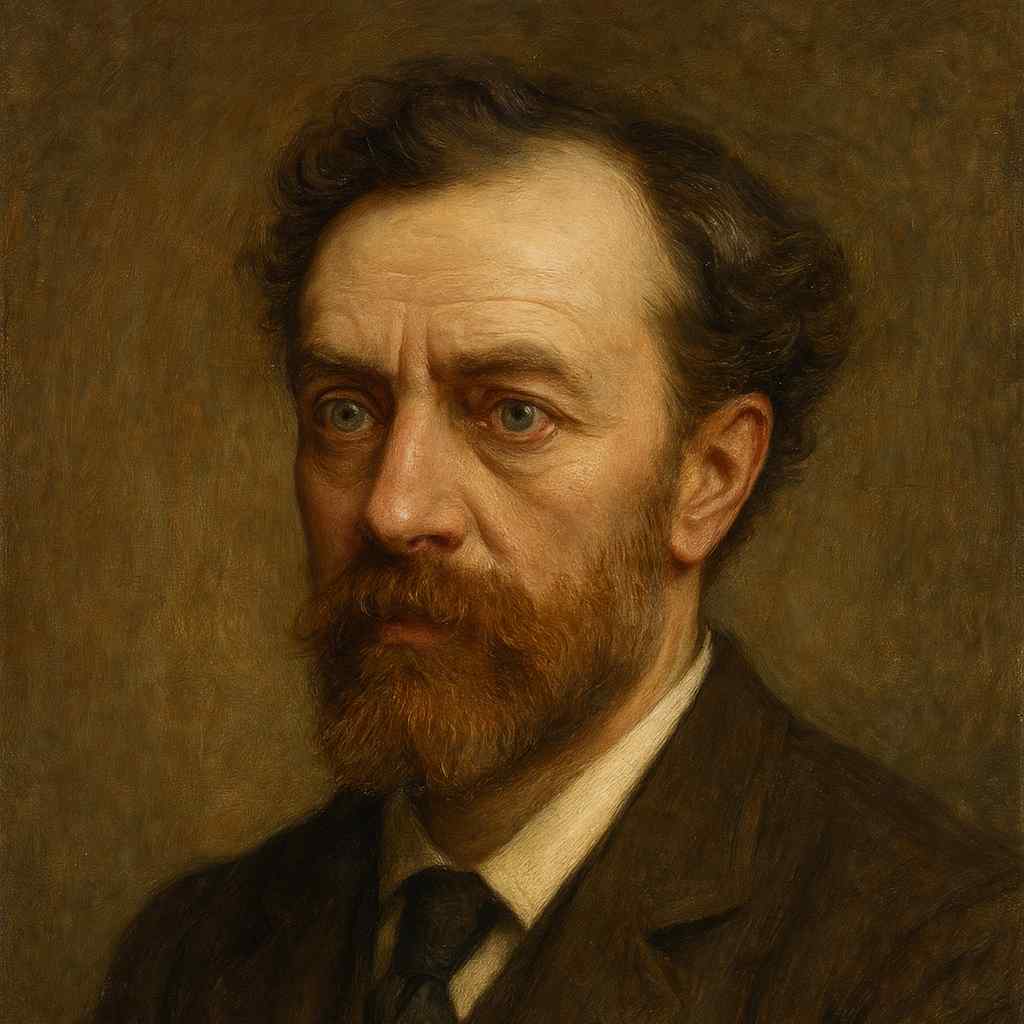1 Poems by John Davidson
1857 - 1909
John Davidson Biography
John Davidson, a Scottish poet, novelist, and dramatist, was born in Barrhead, Renfrewshire, on April 11, 1857. His life and work, often overlooked in the broader scope of Victorian literature, represent a fascinating study in the complexities and contradictions of late 19th-century British poetry and thought.
Davidson's early years were marked by a restless spirit and a diverse education. The son of a minister, he was exposed to rigorous religious instruction from a young age, a factor that would later influence his poetry's themes and his lifelong struggle with faith. He attended Highlanders' Academy in Greenock and then the University of Edinburgh, though he never completed a degree. This formal education, combined with his voracious autodidacticism, laid the groundwork for his eclectic literary output.
In his twenties, Davidson worked as a teacher in Scotland and England, an experience that informed his keen observations of society and human nature. His first forays into writing were in drama, with plays like "Bruce" (1886) and "Smith: A Tragic Farce" (1888) showcasing his early talent for blending tragedy and comedy. However, it was poetry that would become his primary medium and the source of his most enduring work.
Davidson's poetic career began in earnest with the publication of "In a Music Hall and Other Poems" in 1891. This collection, while not immediately successful, introduced themes that would become hallmarks of his work: urban life, social criticism, and philosophical inquiry. His style was notable for its blend of traditional forms with more modern, colloquial language, creating a distinctive voice that bridged the gap between Victorian convention and modernist innovation.
The 1890s saw Davidson's most productive and critically acclaimed period. "Fleet Street Eclogues" (1893) and its sequel in 1896 solidified his reputation as a poet of urban life, offering vivid portraits of London's literary scene and working-class struggles. These works demonstrated Davidson's skill in adapting the pastoral eclogue form to contemporary settings, a technique that impressed fellow poets like W.B. Yeats.
Perhaps Davidson's most famous work, "Thirty Bob a Week" (1894), exemplifies his ability to capture the voice of the common man. This dramatic monologue, narrated by a lowly clerk, combines humor, pathos, and social commentary in a way that anticipates the work of later poets like T.S. Eliot. Its unflinching look at poverty and the human condition resonated with readers and critics alike.
Davidson's philosophical leanings became more pronounced in his later works. "The Testament of a Man Forbid" (1901) and "The Testament of an Empire Builder" (1902) reveal his engagement with Nietzschean ideas and his growing disillusionment with traditional religious and social structures. These longer poems, dense with allusions and complex ideas, showcase Davidson's intellectual ambition but also marked a shift away from the more accessible style of his earlier work.
Throughout his career, Davidson struggled with financial insecurity and depression. Despite periods of recognition and success, including a Civil List pension granted in 1906, he found it difficult to sustain a living solely through his writing. This economic pressure drove him to produce a vast and varied body of work, including novels, essays, and translations, in addition to his poetry.
The latter years of Davidson's life were marked by increasing pessimism and isolation. His philosophical views became more radical, as evidenced in works like "The Testament of John Davidson" (1908), which espoused a form of materialist monism that rejected both traditional religion and contemporary scientific theories. This intellectual stance, combined with his deteriorating mental health, contributed to his estrangement from the literary establishment.
Tragically, Davidson's life ended in suicide. On March 23, 1909, he disappeared near Penzance, Cornwall. His body was found in the sea months later. This dramatic end has often overshadowed critical appreciation of his work, but it also speaks to the intense personal struggles that informed his poetry.
Davidson's legacy in English literature is complex. While he never achieved the lasting fame of some of his contemporaries, his influence can be traced in the work of poets who followed, particularly in his use of vernacular language and his exploration of urban themes. His ability to blend philosophical depth with emotional resonance anticipates modernist poetry, making him an important transitional figure between Victorian and 20th-century literature.
In recent years, there has been a renewed interest in Davidson's work among scholars and poets. His unflinching examination of social issues, his innovative use of form, and his philosophical depth offer rich material for contemporary analysis. Davidson's poetry, with its unique blend of tradition and innovation, continues to reward close study and offers valuable insights into the literary and cultural landscape of late Victorian Britain.
John Davidson's life and work embody the tensions and transitions of his era. A poet of both the city street and the cosmos, he grappled with the great questions of existence while never losing sight of the everyday struggles of ordinary people. His poetry, at turns witty, despairing, and profoundly insightful, remains a testament to a unique voice in British literature, one that spoke to the complexities of the modern condition with remarkable prescience and power.
This text was generated by AI and is for reference only. Learn more
Username Information
No username is open
Everything is free to use, but donations are always appreciated.
Quick Links
© 2024-2025 R.I.Chalmers (V2Melody).

All music on this site by R.I.Chalmers (V2Melody) is licensed under a Creative Commons Attribution-NonCommercial 4.0 International License.
Attribution Requirement:
When using this music, you must give appropriate credit by including the following statement (or equivalent) wherever the music is used or credited:
"Music by R.I.Chalmers (V2Melody) – https://v2melody.com"
Support My Work:
If you enjoy this music and would like to support future creations, your thanks are always welcome but never required.
Thanks!


